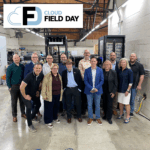|
|
 HPE Presented at Cloud Field Day 24 |
This Presentation date is October 23, 2025 at 8:00-9:30.
Presenters: Bharath Ram, Brad Parks, Dave Elder, Ed Beauvais, Juden Supapo
HPE’s Hybrid Cloud Strategy & Portfolio Overview
Watch on YouTube
Watch on Vimeo
Brad Park from HPE opens by outlining the company’s hybrid cloud strategy and portfolio, emphasizing the importance of achieving a cloud operating model for AI and other initiatives. He highlights the challenges posed by technical debt and the complexities of heterogeneous enterprise environments. The goal is to address these complexities with solutions that transcend individual tech stacks, focusing on provisioning, governance, security policy, and FinOps at a broader level.
The HPE portfolio is presented as a “Fantastic Four” analogy, with GreenLake as the unifying leader, providing a platform for accessing various HPE services through a single pane of glass. The CloudOps Suite is introduced as the software control plane, comprising Morpheus for self-service provisioning and lifecycle management, OpsRamp for observability and reducing mean time to resolution, and Zerto for cyber resiliency and data recovery. This suite aims to manage the lifecycle of application workloads across any cloud, hypervisor, or hardware profile.
Beyond the core components, HPE offers a private cloud portfolio with pre-engineered turnkey systems and flexible options, leveraging the CloudOps Suite. The ultimate goal is to help customers achieve a modern cloud operating model, improve efficiency, and accelerate time to value for both traditional and AI workloads. HPE is also working on integrating these services, building on existing integrations, and enabling use cases like automated database deployment with cost optimization. The placement of Zerto under the CloudOps suite is explained by its focus on protecting workloads, which exist across different environments and technologies, rather than being tied to specific storage types.
Personnel: Brad Parks
Enabling Hybrid Cloud Anywhere with HPE CloudOps Software
Watch on YouTube
Watch on Vimeo
In this CFD session, we explore how Hewlett Packard Enterprise (HPE) is transforming the way enterprises provision, manage, and protect hybrid cloud environments with the HPE CloudOps Software suite, comprising HPE Morpheus Enterprise, HPE OpsRamp, and HPE Zerto. Including discussion and live demo of HPE’s orchestration and automation control plane for on-prem technologies like VMware, Nutanix, Microsoft, Red Hat, and public clouds, including AWS, Azure, GCP, Oracle, and more.
HPE addresses the complexities of hybrid cloud environments with its CloudOps portfolio, which includes Morpheus, OpsRamp, and Zerto. Morpheus focuses on delivering self-service capabilities for provisioning VMs, containers, and application stacks across various environments, offering a unified catalog of services, a comprehensive API, a Terraform provider, and a ServiceNow plugin. It provides consistency in the provisioning experience and automates the dependencies involved, such as IP address assignment, DNS entries, Ansible scripts, observability agent installation, backup job creation, and cost allocation. Morpheus also includes a built-in cluster management engine for provisioning Kubernetes clusters and offers a KVM stack, now delivered as Morpheus VM Essentials, to provide core hypervisor capabilities.
OpsRamp is geared towards day two and beyond operations, focusing on observability and monitoring of infrastructure. It offers hybrid discovery, observability, and monitoring capabilities across compute, network, storage, virtualization, and containerization, supporting various cloud platforms and providing a unified view of the infrastructure. OpsRamp aims to correlate alerts, identify root causes, and integrate with ITSM platforms for incident management, as well as enabling intelligent automation for remediation. The platform’s architecture involves deploying OpsRamp gateways for on-prem infrastructure and using agents for servers, providing active monitoring and automation capabilities, with plans to incorporate user experience monitoring.
The integration between Morpheus and OpsRamp enables combined day-zero/one and day-two operations, with Morpheus handling provisioning and OpsRamp focusing on monitoring and management post-deployment. The two platforms can be linked to trigger operational workflows for remediation and present observability data within the Morpheus UI. Both platforms emphasize automation, API-driven approaches, and integration with existing tools and workflows, facilitating a unified and streamlined experience for managing hybrid cloud environments. Policies around tagging and access control were also discussed as essential features to support.
Personnel: Brad Parks, Juden Supapo
Eliminating Hypervisor Lock In and Accelerating Private Cloud with HPE
Watch on YouTube
Watch on Vimeo
Live from CFD, uncover how Hewlett Packard Enterprise (HPE) is eliminating VMware lock-in and accelerating Private Cloud adoption with HPE Morpheus VM Essentials. See how this powerful solution integrates VMware environments with HPE’s KVM-based hypervisor for seamless migration, VM-vending, and management. Discover how HPE VM Essentials, available as software or embedded in HPE Private Cloud Business Edition with HPE Alletra B10000 or HPE SimpliVity storage, streamlines virtualization and enhances hybrid cloud agility.
HPE is addressing the challenges customers face due to the Broadcom acquisition of VMware, including escalating costs, vendor lock-in, and uncertain strategies. With the industry seeing a surge in customers actively evaluating alternatives to VMware, HPE offers Morpheus VM Essentials as a solution, providing enterprise-grade features built on the KVM hypervisor. The focus is on delivering a hybrid virtualization management environment through a single pane of glass, allowing customers to manage both VMware and HPE’s HVM (HPE VM clustering) infrastructure. This includes essential tooling for IPAM, DNS, and backup integration.
Morpheus VM Essentials serves as a foundational virtualization product, with the option to upgrade to Morpheus Enterprise for expanded functionality, including private and public cloud management, automation, and ITSM integration. It can be compared to vSphere Enterprise or Enterprise Plus, which includes a vCenter console. HPE provides migration capabilities from VMware to HVM, converting VMDK to QCOW2 disk format during the process. It leverages its own proprietary tool built into the Morpheus UI and does not use third-party tools.
VM Essentials is supported on HPE’s disaggregated HCI and SimpliVity hyper-converged infrastructure, offering flexibility in deployment and hardware choices, as well as support for third-party hardware. HPE is actively working with ISVs, including backup vendors like Veeam, Commvault, and soon Cohesity, to provide comprehensive integration with the platform. By offering these solutions, HPE aims to alleviate VMware lock-in and enhance hybrid cloud agility for its customers. It integrates with GreenLake through deployment options and by feeding telemetry data to GreenLake dashboards.
Personnel: Bharath Ram Ramanathan, Dave Elder
From Zero to AI Hero with HPE Private Cloud and Storage Solutions
Watch on YouTube
Watch on Vimeo
Discover how HPE Private Cloud AI (PCAI), co-engineered with NVIDIA, delivers a fast, scalable foundation for enterprise AI workloads. See how HPE Alletra MP X10000 Storage powers data-driven innovation with built-in data intelligence and ultra-fast object performance with RDMA to streamline data pipelines—accelerating customers’ AI journey.
Ed Beauvais from HPE presented the HPE Alletra MP X10000 storage solution, emphasizing the challenge that many AI pilot projects fail to reach production due to data-related issues. He highlighted the need for a shift in mindset, where data is considered the product, particularly in the context of generative AI and RAG. The presentation underscored the importance of having fresh, trusted, and well-managed data for building effective AI models, particularly in a distributed infrastructure environment. HPE’s Alletra Storage MP architecture offers a cloud operating model for managing this data, with the X10000 specifically designed to accelerate data readiness for AI, offering fast performance, simplified management, and enterprise-grade features.
A key innovation discussed was RDMA for Object, enabling near doubling of throughput, reduced latency, and lower host CPU consumption, all aimed at accelerating insights. HPE is moving beyond traditional storage by incorporating built-in data intelligence, enabling customers to gain deeper insights into their data assets. The presentation also detailed HPE’s approach to transforming unstructured data by adding metadata tags in an open format (Iceberg tables), facilitating SQL queries and integration with LLMs. This enables the extraction of vector embeddings and integration with an MCP server, providing agentic AI with insights into the storage system and enhancing security and data curation.
Looking forward, HPE plans to bring compute closer to the data, offering customers flexible management facilities and working with solution providers to enable data cataloging and management. HPE envisions a future where customers can bring their own models for data analysis, with a data intelligence server integrated within the storage fabric. The ultimate goal is to provide intelligence and visibility across the entire unstructured data ecosystem, enabling customers to fully leverage their data assets through the ElectroStorage MP platform.
Personnel: Ed Beauvais









